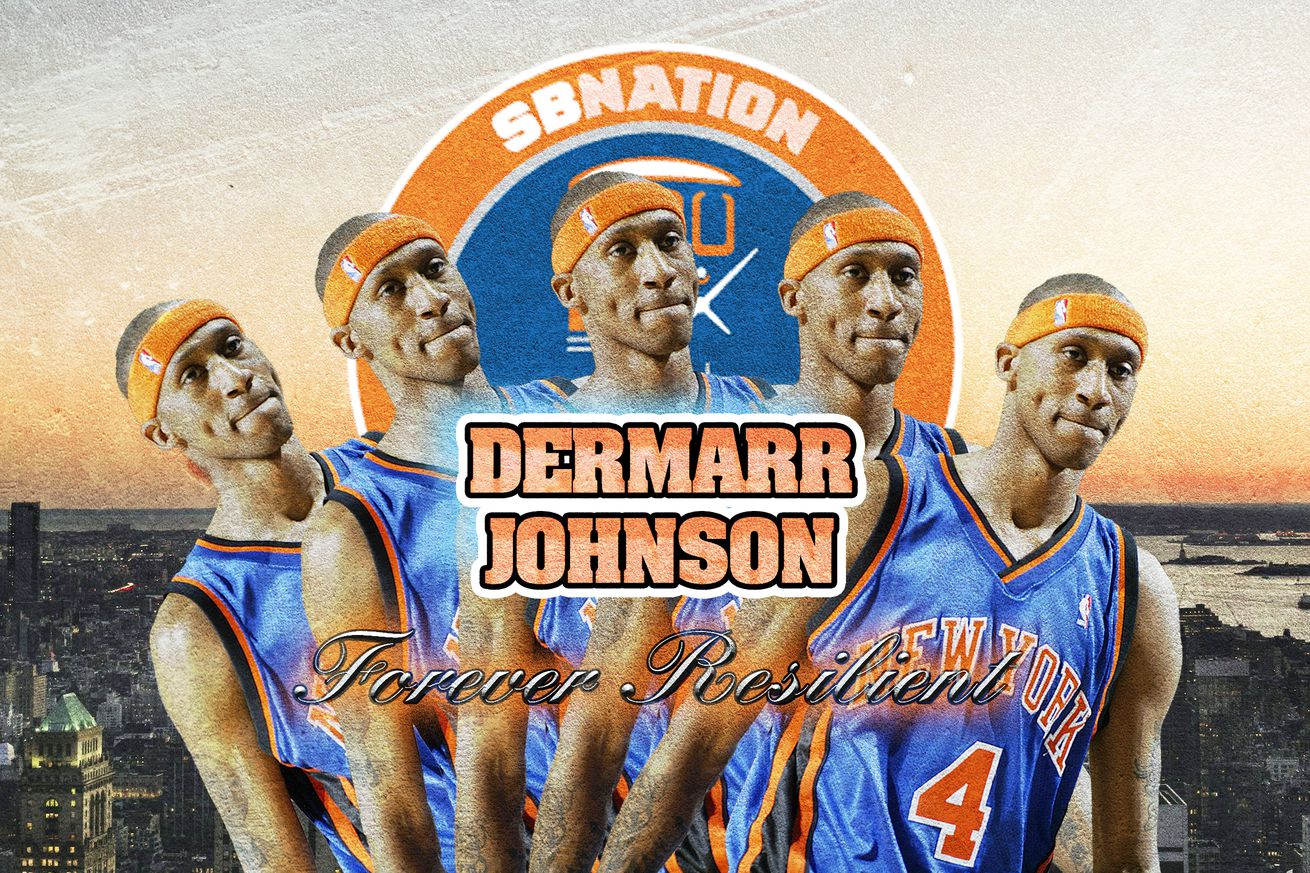
Forever Resilient
By the end of the 2003-04 season, DerMarr Johnson had rejuvenated his NBA career. He had beaten the odds of making it back to the NBA and proving all his doubters wrong.
After playing 21 games with the Knicks and helping them reach the playoffs, they were eliminated in the first round by his former college teammate Kenyon Martin and the New Jersey Nets. As Johnson’s initial plan of resigning with the Knicks fell through, he expressed a strong desire to reunite with Martin in New Jersey. However, when Martin was traded to the Denver Nuggets during the offseason, that option was no longer a possibility. Johnson’s agent, who had a strong relationship with then Denver Nuggets General Manager Kiki VanDeWeghe, reached out and was able to secure him a tryout with Denver, which Johnson took full advantage of and earned a roster spot alongside his former teammate, in addition to Carmelo Anthony, J.R. Smith, Marcus Camby, and Andre Miller.
The Knicks deal falling through turned out to be a blessing in disguise for DerMarr. Fortunately, Denver had roster spots available, and although he still had to try out, adversity was something he never shied away from. Through hard work during training camp and the pre-season, Johnson earned his spot with the 2004 Denver Nuggets.
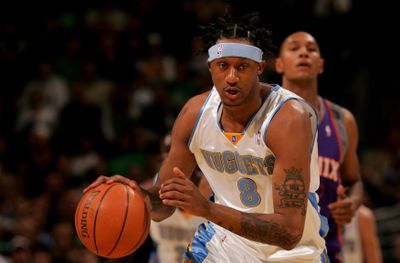
Photo by Doug Pensinger/Getty Images
In his first season with the team, the Nuggets boasted a roster filled with young superstar talent but struggled out of the gate. After a 13-15 start, the team parted ways with head coach Jeff Bzdelik. Michael Cooper stepped in as interim head coach before George Karl was ultimately hired to take the helm. “After the All-Star break (George Karl) decided to start me. He told me that I’m going to start you, but you need to get me an offensive rebound and a lay-up in the first seven minutes of every game, or I’m not going to put you back in.”
Johnson saw this as a personal challenge, recognizing that his primary strengths were his defensive prowess on the wings, NBA his athleticism, and his shooting abilities, which were not usually tied to excelling in offensive rebounding. Rather than shying away from the challenge, Johnson embraced it, ultimately starting 40 games for the Nuggets. “My best year… playing-wise, is that second year in Atlanta… but in Denver we’re winning. I got my boys with me, and we’re winning. I’d talk to my former teammates in New York, and they would tell me how lucky that I was to get out of New York.”
Once DerMarr entered the starting lineup for the Nuggets, they got hot… white hot. “We went like 29-4 once I started starting, we were rolling… but we ran into the Spurs and lost to the Spurs in the playoffs.” Johnson finished the season with a career-high .499 shooting percentage, helping the Nuggets secure a 49-33 record and a second-place finish in the NBA’s Northwest Division.
Life was good. DerMarr was thriving as a Denver Nugget, enjoying the beauty of one of the NBA’s most picturesque cities and playing for one of the league’s top teams. For the first time in years, DerMarr felt a deep sense of happiness both on and off the court. He had proven himself on the court to the Nuggets on all ends of the court. With his one-year deal expired, he was now anticipating the team to demonstrate their commitment to him in return.
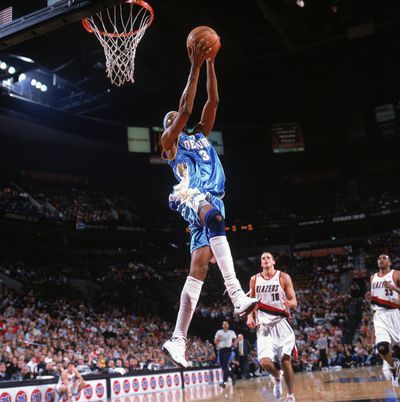
Photo by Sam Forencich/NBAE via Getty Images
Things didn’t go as planned, however. The Nuggets acquired Reggie Evans and Earl Watson, pushing them over the salary cap. While they wanted to bring DerMarr back, they informed him they could only offer a one-year minimum deal. Unlike in previous years, DerMarr now had other options. “Laurence Frank called me himself… remember I wanted to play with J-Kidd… (Frank called saying) ‘Slim we need you man, come over here man’” But DerMarr wasn’t ready to step away from his comfort zone of playing alongside his friends on a dominant team.
The Nuggets assured Johnson that if he returned to the team on a one-year minimum contract, a guaranteed four-year deal would await him the following season, regardless of performance. They also emphasized that if he outperformed the contract, he would have the freedom to pursue more lucrative opportunities elsewhere. Feeling he had little to lose, DerMarr agreed to the one-year deal, confident that his strong performance in the latter half of the 2004-05 season would carry over into the 2005-06 campaign, enabling him to outplay the contract. And if things didn’t go as planned, the four-year deal would still serve as a safety net.
As the 2005-06 season began, the momentum DerMarr had built from the previous year quickly faded when Coach Karl opted to relegate DerMarr back to the bench. His starts were cut in half, and his total appearances dropped from 71 games the previous year to just 58. “I was uncertain why my time and role dipped, and I believe it had nothing to with my ability or anything that I did wrong.” Johnson explained. With the reduced playing time, Johnson’s performance declined across the board, with decreases in all major statistical categories.
As the season concluded, DerMarr entered the offseason as a free agent, frustrated by how the year had unfolded. Despite his declining numbers, he still received interest from other teams across the league. However, none of the offers were compelling enough to outweigh the four-year deal the Nuggets had promised him the previous offseason.
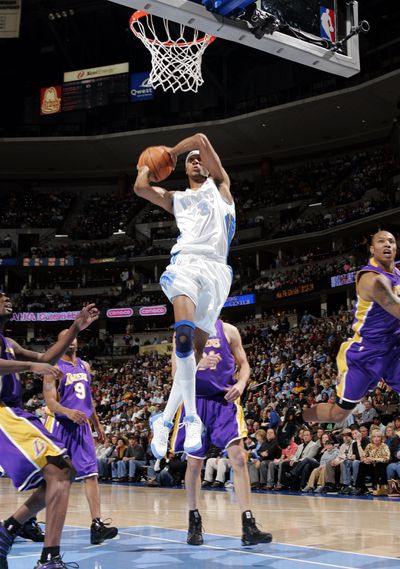
Photo by Brian Bahr/Getty Images
As teams finalized their rosters, DerMarr waited patiently for the promised paperwork. However, during the offseason, the Nuggets parted ways with General Manager Kiki VanDeWeghe, who had been a steadfast supporter from the moment DerMarr joined the team. The two shared a strong bond built on trust, with Kiki consistently prioritizing DerMarr’s best interests. Unfortunately, the new GM hired to replace VanDeWeghe chose not to honor any of the commitments previously made to DerMarr.
Without a contract, DerMarr sat out of the beginning of training camp. After weeks of sitting out, Bret Bearup who had been in DerMarr’s corner since high school, approached DerMarr with the assurance that he would get him the money. “I’m going to make it my business to get you your money.” Johnson recalled him saying “If you can wait around to December, January, maybe we could try to make some trades… come back, play for the minimum again, we are going to honor it.”
DerMarr opted to return to the Nuggets, but his playing time dwindled further under Coach Karl, who informed him of his decision to not play him as a consequence of his absence from training camp.
When the season concluded, once again his promised deal was never honored, and after appearing in just 39 games that season while posting career lows, his future in the NBA seemed uncertain. He received invitations to try out for other teams at their training camps, but his agent encouraged him to consider playing overseas, where he could earn more money, dominate games like the star he knew he was, and secure the contract he deserved once his time abroad was over.
Despite the tempting offer, DerMarr remained resolute. He knew his worth. He saw what players not up to his caliber were being offered, and in his heart, he knew he belonged in the NBA. After everything he had overcome off the court to recover from the tragic accident, going overseas felt like a step backward in his career. He decided to part ways with his agent, thinking he could find someone with a smaller roster of clients who would work harder to secure the NBA contract he was seeking. However, this decision to part with his agent would be one he would later and forever regret. “Once I went to the other agent, he didn’t get much done. I ended up going to Italy for half the money that (my previous agent) had for me.”
After a stint in Italy with Benetton Treviso in August 2007, Johnson returned to the United States to join the San Antonio Spurs’ D-League affiliate, the Austin Toros, following interest from the Spurs. His strong performances earned him a call-up, and on December 29, 2007, the Spurs signed him to their roster. In just his third game with the team, Johnson made an impact, scoring eight points in only five minutes against his former team, the New York Knicks. “Pops came in and said to me that I changed the flow of the game, and I helped them win the game… and I’m thinking I’m set,” Johnson recalled. “Then I end up right before the deadline where it was either they had to cut me or keep me for the year… and they let me go to keep their options open.” Johnson would end up back with the Toros a mere week and a half after joining the Spurs, where his strong play earned him a second shot with the Spurs, who re-signed him in April for the remainder of the season. After appearing in five regular season games with San Antonio, the spring of 2008 would mark the end of DerMarr’s NBA career.
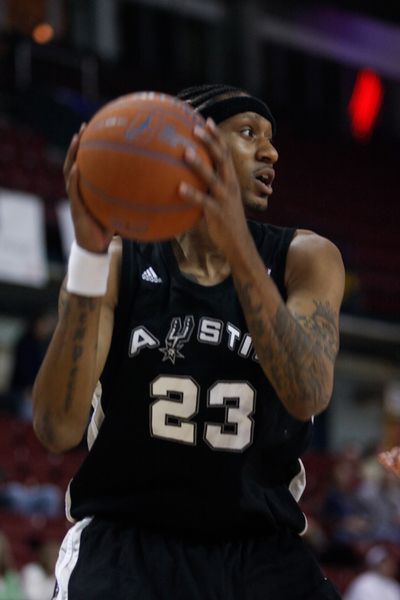
Photo by Otto Kitsinger/NBAE via Getty Images
In October 2010, Johnson resumed his professional basketball journey overseas by signing with Hekmeh in Lebanon. Eleven months later, in September 2011, he joined the Colombian League as a member of the Bukaros. His most successful year abroad came in 2012 with the Osos de Guadalajara in the Mexican Liga Nacional de Baloncesto Profesional, where he averaged an impressive 26.7 points and 6.3 rebounds per game.
After three more seasons spanning four different overseas clubs, DerMarr’s playing career concluded in 2015. However, his journey ended with a lingering “what if”—a question that will forever remain at the forefront of his mind. “I had no idea that my second season in Denver, (Coach Karl) would just decide to not start me and play me like he played me the year before. Still to this day, I’m really curious what the starting lineup of Andre Miller, me, Melo, Kenyon, and Marcus Camby, what our record would have been as starters.” Johnson recalled, “We won a lot of games. Even in that playoff series with the Spurs that year, we beat the Spurs the first game in San Antonio. We lost the second game… then George pulled me out of the starting lineup, and we didn’t win another game.”
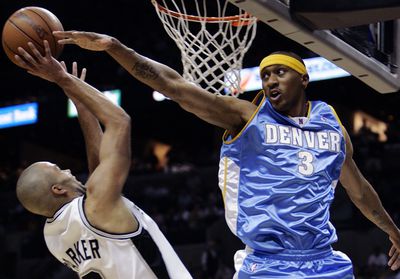
Photo by Brian Bahr/Getty Images
After retiring from professional basketball, DerMarr Johnson found a fresh opportunity in 2017 when iconic rapper Ice Cube introduced the Big 3, a revolutionary 3-on-3 basketball league. Designed exclusively for retired professional players, the league provided a unique platform for former stars to return to the court and continue showcasing their talents.
Johnson’s close friend and former collegiate and Denver Nuggets teammate, Kenyon Martin, initially approached him with the proposition of joining his Big 3 squad, alongside Al Harrington and Gilbert Arenas. As the Big 3 season neared and rosters began to solidify, the league announced that team captains would be tasked with selecting their co-captains. Martin selected Harrington for the role.
Unexpectedly, another long-time close friend and former Nuggets teammate, Allen Iverson, reached out to Johnson with the request to join his own Big 3 team. Though deeply honored by Iverson’s overture, Johnson’s loyalty to Martin prompted him to decline. Undeterred, Iverson persisted, asserting DerMarr, “If Kenyon picked Al Harrington as his co-captain, then you’re my co-captain.” Johnson, who regards Martin as an older brother figure, countered that he would only consider the offer if Iverson personally reached out to Martin and secured his approval.
Weeks later, Iverson contacted Johnson, stating that he had spoken with Martin, and he had his blessing to join his team. Before he could officially accept, Johnson reached out to Martin to confirm that he and Iverson spoke. Taken aback, Martin replied, “No, why?” Johnson elaborated, “Chuck has been trying to recruit me this whole time, but I told him I’m committed to you, and now he’s trying to make me his co-captain.” Recognizing the remarkable opportunity this presented for his friend, Martin wholeheartedly encouraged Johnson to embrace the role of co-captain.
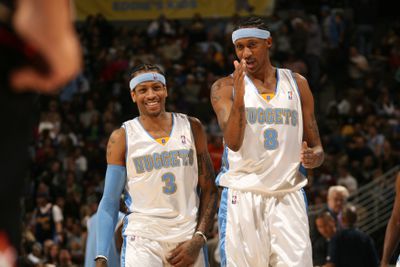
Photo by Nathaniel S. Butler/NBAE via Getty Images
This pivotal decision catapulted Johnson into a quasi-general management position, allowing him to immerse himself in the operational aspects of the league, including the combine and draft process, more so during his second year with the Big 3, when he became the team’s captain.
The expertise he gained during this tenure served as a steppingstone in his career, which he would later translate upon accepting the role as an assistant coach for the NCAA’s West Virginia Mountaineers in 2023.
It has been nearly 25 years since DerMarr Johnson was drafted by the Atlanta Hawks, embarking on an extraordinary journey marked by triumphs, setbacks, and unwavering perseverance. His path exemplifies a rare achievement, as studies indicate that only 1.2% of collegiate players ever ascend to the professional ranks, a distinction that underscores the remarkable life Johnson has lived.
“At the end of the day, I was the sixth pick in the NBA Draft. I made it to the NBA. I’ve done some amazing things.” Johnson recollects, “I never gave up. I could’ve cashed in on insurance money and gave up playing basketball and got into coaching at 22 years old. But with basketball, I felt like I was born to play this game. I had been given a lot of tools, and it allowed me to get to the highest level of the sport… I’m blessed to be where I am and to have been where I have been.”
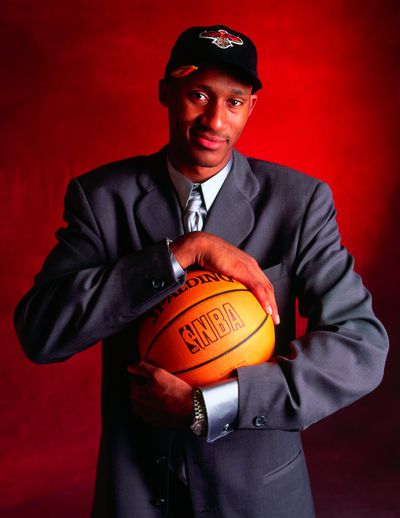
Photo by Jesse D. Garrabrant/NBAE via Getty Images